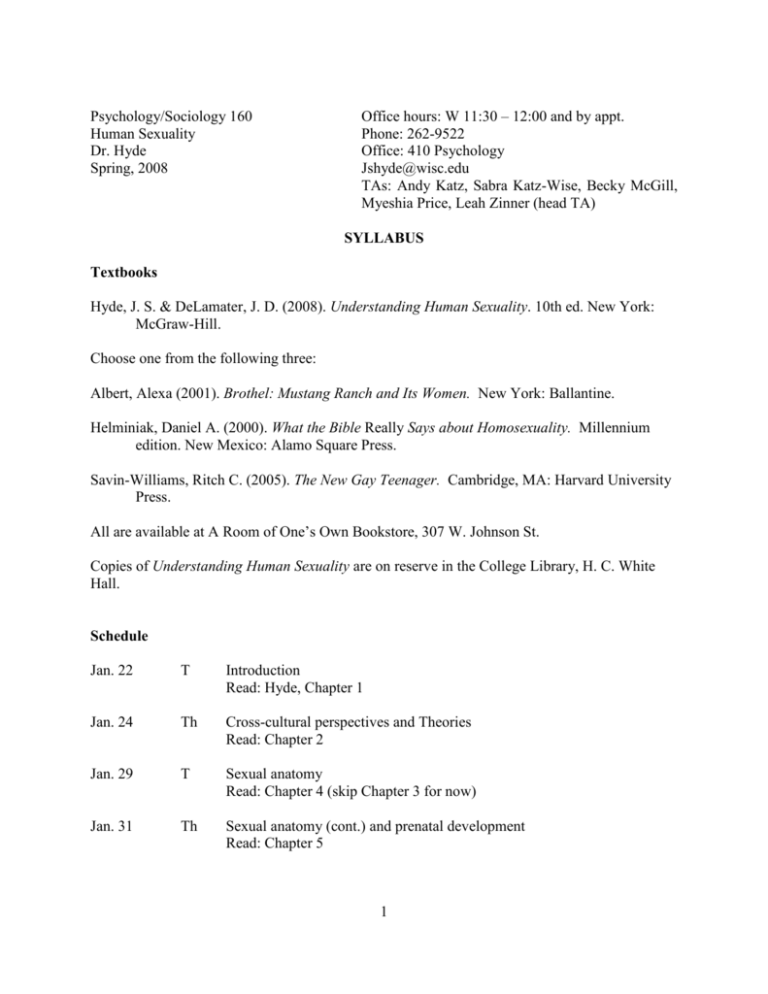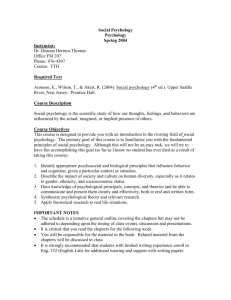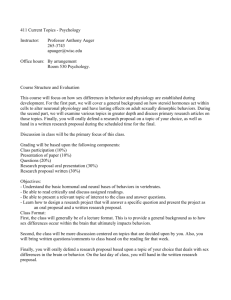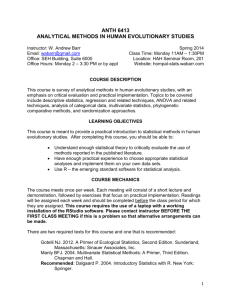
Psychology/Sociology 160
Human Sexuality
Dr. Hyde
Spring, 2008
Office hours: W 11:30 – 12:00 and by appt.
Phone: 262-9522
Office: 410 Psychology
Jshyde@wisc.edu
TAs: Andy Katz, Sabra Katz-Wise, Becky McGill,
Myeshia Price, Leah Zinner (head TA)
SYLLABUS
Textbooks
Hyde, J. S. & DeLamater, J. D. (2008). Understanding Human Sexuality. 10th ed. New York:
McGraw-Hill.
Choose one from the following three:
Albert, Alexa (2001). Brothel: Mustang Ranch and Its Women. New York: Ballantine.
Helminiak, Daniel A. (2000). What the Bible Really Says about Homosexuality. Millennium
edition. New Mexico: Alamo Square Press.
Savin-Williams, Ritch C. (2005). The New Gay Teenager. Cambridge, MA: Harvard University
Press.
All are available at A Room of One’s Own Bookstore, 307 W. Johnson St.
Copies of Understanding Human Sexuality are on reserve in the College Library, H. C. White
Hall.
Schedule
Jan. 22
T
Introduction
Read: Hyde, Chapter 1
Jan. 24
Th
Cross-cultural perspectives and Theories
Read: Chapter 2
Jan. 29
T
Sexual anatomy
Read: Chapter 4 (skip Chapter 3 for now)
Jan. 31
Th
Sexual anatomy (cont.) and prenatal development
Read: Chapter 5
1
Feb. 5
T
Hormones, menstruation, and menopause
Read: Chapter 5
Feb. 7
Th
Childbirth
Read: Chapter 6
Feb. 12
T **EXAM 1: Chapters 1, 2, 4-6, and lectures
Feb. 14
Th
Contraception
Read: Chapter 7
Feb. 19
T
Contraception (cont.)
Feb. 21
Th
Physiology of sexual response
Read: Chapter 8
Feb. 26
T
Research methods
Read: Chapter 3
Feb. 28
Th
Sexual development across the lifespan
Read: Chapter 9
Mar. 4
T
Lifespan (cont.)
Read: Chapter 10
Mar. 6
Th **EXAM 2: Chapters 3, 7-10 and lectures
Mar. 11
T
Attraction and love (skip section on communication for now)
Read: Chapter 11
Mar. 13
Th
Gender and sexuality
Read: Chapter 12
Mar. 18, 20
Spring Break
Mar. 25
T
Sexual orientation
Read: Chapter 13
Mar. 27
Th
Sexual variations
Read: Chapter 14
Apr. 1
T
Rape
Read: Chapter 15
2
Apr. 3
Th
Sexual variations (cont.), Transgender
Read: Part of Chapter 12 on transgender
Apr. 8
T
Pornography
Read: Chapter 16
Apr. 10
Th **EXAM 3: Chapters 11-16 and lectures
Apr. 15
T
Communication
Read: Chapter 11, section on communication
Apr. 17
Th
Sexual Disorders and Sex Therapy
Read: Chapter 17
Apr. 22
T
Sexually transmitted diseases
Apr. 24
Th
Sexually transmitted diseases (cont.)
Read: Chapter 18
Apr. 29
T
Video on new reproductive technologies
May 1
Th
Ethics, religion, and sexuality
Read: Chapter 19
May 6
T
Sex and the law
Read: Chapter 20
May 8
Th
Sex education
Read: Epilogue
May 13
T **COMPREHENSIVE FINAL EXAM (#23), 12:25 - 2:25 p.m.
Grading
Grades are assigned at the end of the semester based on points earned. There will be a total of
310 possible points, based on 3 exams (the first counting 50 points, the other 2 counting 40
points each), a comprehensive final examination (100 points: 20 points on last unit, 80 points
comprehensive), and 80 points from performance in discussion sections, which will include the
paper on the book you choose. Details on the assignment of points for discussion sections will
be distributed by the TAs in a Discussion Section Syllabus. Attendance at discussion sections is
required.
The format of the exams will generally be 40-50 multiple choice items. Writing assignments
3
will be given in discussion sections.
No makeup exams will be given unless the professor (not your TA) has been contacted in
advance of the exam and a written excuse is provided by the student. No exceptions will be
made to this policy. Makeup exams will consist of 3 essay questions. Students who do not take
an exam and do not meet the conditions for taking a makeup will receive 0 points for that exam.
Students are expected to practice academic honesty on all graded assignments. The penalty for
academic dishonesty (e.g., cheating on an exam or plagiarizing on a paper) will be the awarding
of 0 points for that assignment.
Course Objectives
1. To learn practical information about the biological, psychological, and social aspects of
sexuality that people need to know for daily living -- e.g., information about contraception,
sexually transmitted diseases.
2. To learn about methods used in the scientific study of sex, to gain a better understanding of
existing data and be able to evaluate studies that will be published in the future.
3. To learn about the fabulous diversity of human sexuality along many dimensions, including
age, sexual orientation, ethnicity within the United States, and cultures around the world.
4. To become comfortable with the topic of SEX, so that you can be more rational in making
decisions about it.
Other Notices
I wish to include persons with disabilities fully in this course. Please let me know if you
need any special accommodations in the curriculum, instruction, or assessments of this course to
enable you to participate fully. You must let me know during the first week of classes. I will try
to maintain confidentiality of this information you share with me. If you have a McBurney pass
and need accommodations such as special testing, you must see me during the first week of
classes.
Where to take complaints about a Teaching Assistant or Course Instructor:
Occasionally a student may have a complaint about a T.A. or course instructor. If that
happens, you should feel free to discuss the matter directly with the T.A. or instructor. If the
complaint is about the T.A. and you do not feel comfortable discussing it with him or her, you
should discuss it with the course instructor. If the problem is not resolved to your satisfaction or
you do not want to approach the instructor, make an appointment to see the Chair of the
Psychology Department, Professor Joseph Newman (room 238 Psychology, phone 262-1040,
4
email jpnewman@wisc.edu). You should also speak to the Department Chair if the complaint is
about the instructor and you do not feel comfortable discussing it directly with him or her.
If your complaint has to do with sexual harassment, please contact Susan Gallagher,
Psychology Department Administrator (room 218 Psychology, phone 262-1042, email
sdgallag@wisc.edu). If you believe the T.A. or course instructor has discriminated against you
because of your religion, race, gender, sexual orientation, or ethnic background, take your
complaint to the Office of Equity and Diversity (room 179-A Bascom Hall).
If your T.A. is not a native English speaker and you have difficulty understanding his or her
speech, ask the T.A. to repeat sentences that you do not understand. If you have serious or
prolonged difficulty understanding, discuss the problem with the course instructor. But
remember that this is a multicultural institution and that the diversity of T.A.s can add
substantially to your education. Some patience with unfamiliar accents may reward you with a
better understanding of the world.
Honors
If you are taking this course for Honors, you must see Dr. Hyde during the first week of
the semester so that we can discuss expectations.
5









